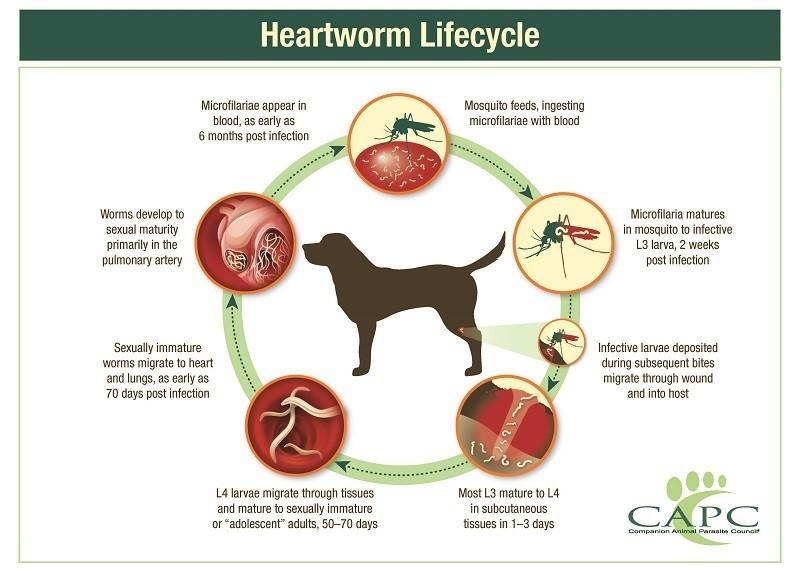The topic of heartworm is complex, but we are going to try to just give you enough info to help make informed decisions.
Disclaimer: we are not vets, so be sure to ask your vet for more info!

How is heartworm transmitted?
Mosquitoes. Yup, it’s as easy as that! An infected mosquito can carry the disease from dog to dog.
But I don’t have heartworm in my area.
If you live in an area with mosquitoes, heartworm is a risk. In Ontario (and other parts of Canada), there are regions that have a high probability of heartworm. The main issue is people who don’t treat their pets, allowing their pets to be infected and then passing it along to other dogs. If you are at a higher elevation (like Puebla, which is 7,000 feet above sea level), the risk is greatly reduced. Of course, climate change is throwing off the predictability of mosquitos in our environments.
My vet doesn’t mention anything about heartworm, at our annual visits.
DIBS (and other reputable rescues) do vet reference checks, and after thousands and thousands of references, we’ve never heard of a vet not recommending a plan to manage/prevent heartworm. We do know that vet visits can be fast and furious with information and terms that are new to us. The heartworm chat with your vet falls into two categories:
- Testing: This is a blood test to see if your dog has been infected. Most vets recommend an annual test, but some accept every other year instead.
- Preventative: This is a medicine/prescription that your vet can provide you with. It’s typically given during mosquito season—approximately May to November—but with changes in climate, mosquitoes surprise us with their resiliency, and we find these dates are being extended, sometimes as early as March or April. When chatting with your vet, listen for words like NexGard Spectra (not to be confused with just NexGard) Revolution, Sentinel, and Advantage Multi (not to be confused with just Advantage/Advantix) – but there are many other brands. When your vet mentions their recommendations, don’t be afraid to simply ask “What does this cover?” Things you care about—mosquitoes/heartworm, ticks, fleas. Not all meds cover all three, so do ask!
I had a heartworm test and it was fine, but later the dog tested positive.
At the risk of getting too technical, heartworms have a lifecycle and they need to evolve to become harmful. Baby heartworms are called microfilaria and a typical heartworm test cannot detect them. Using preventatives while they are in the microfilaria stage will kill them. Once the microfilaria becomes adults, they start damaging the dog’s heart. It’s because of this lifecycle that rescues (DIBS included) require newly adopted dogs to continue preventatives immediately after adoption for 6 months at a minimum (duration will depend on month timeframe, but in Canada April to November should be covered as standard, which will likely add to the duration).
Ugh, I hate giving my dogs meds. What can I do instead?
We get this, and we appreciate your perspective. As with anything in the category of holistic vetting, taking a holistic approach involves more thought and financial investment. Discuss alternatives with your holistic vet. You will likely be required to test twice per year instead of annually. If you do decide on meds, consider NexGard Spectra, as it covers prevention of both heartworm, and flea/tick related diseases.
When we ask people why they don’t use preventatives, we’ve heard it all! We hope this additional information provides a starting point for heartworm education. Of course, we aren’t vets, so don’t take our word for it—please read more on this very important topic!
Further reading:
- Keep the Worms Out of Your Pet’s Heart! The Facts about Heartworm Disease—FDA
- Heartworm in Dogs: Facts and Myths—Fetch by WebMD
- Heartworm: What You Really Need to Know—Clappison Animal Hospital
- How High and Far Can Mosquitoes Fly?—InsectCop
- Heartworm and Higher Elevations
